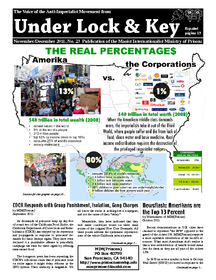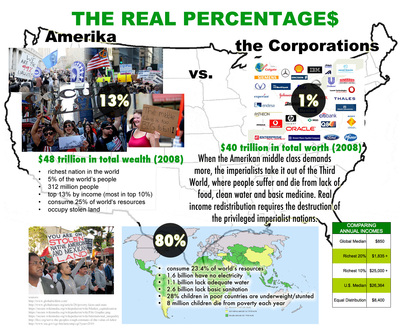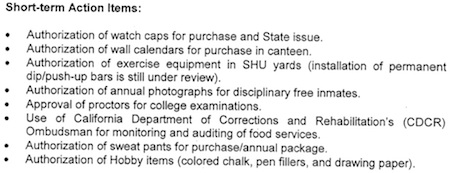So we now have the attention of the state, what is it that we will do
with it? We have shown the ability to logically comprehend the
repression that we’re up against, and the strength to take a stand
against the common oppressor, but what’s to be done after we’re
standing?
After we’ve shot that bow across, or at that battleship, known to some
as the CDCR and to others as the oppressive state of California; what is
to be done next? Do we continue advancing on the enemy or do we retreat
in the face of a failed tactic? This is the true question to be answered
by the leaders of our movement.
Recently CDCR put out a memo of what it is they’d like us to do (see
September 27 memo
“Inmate
Programming Expectations Relative to Hunger Strike”); they want us
to retreat. And if we don’t, “disciplinary action” will be taken against
us.
So there you have it. For the arrow that was shot at the state, at a
time when we need to be concentrating our energies into resolving the
contradictions within the prison population dividing us, CDCR has fired
back with its canon to not only discourage participation and leadership
in peaceful protest, but has begun to set the stage for punishment for
such protest.
They call it a disturbance to the safety and security of “their”
established institutional order; our mass actions disrupt the everyday
program of the department. Give this a little time to ferment and it
will become, for every leader of such activities, disturbing the peace
officer and obstructing duties. This is a felony offense that I am being
prosecuted for in a state court as I write.
Do we retreat or advance? I personally believe that at this stage
comrades should retreat. We should fall back and focus on the divisions
that are the primary reason for low participation of prisoners.
Most will feel that because we fall back we stop in this struggle, but
they are wrong as our struggle is a protracted one.
This was a great shock therapy experiment. Now we must learn from
yesterday, live for today and plan for tomorrow. In this war we must
pick battles big enough to matter, yet small enough to win.
Let us not forget that although our civil disobedience is one of a
peaceful nature it is still disobedience and can result in greater
repression and punishment. Yes we are willing to die for a change of the
current conditions, but are the masses willing to keep the movement
alive after we’re dead? Because the masses aren’t even yet trained in
such civil disobedience, the answer is no, they won’t keep the movement
alive. We can’t expect them to do anything less than die out once their
leaders die, and the state has begun its disciplinary actions against
them. They have their lights on us for real now, so there isn’t much to
cloak our activities under. Our leaders will be targeted, so we must
prepare others to lead when they fall.
We haven’t trained our people in the effective art of hunger striking,
how they must drink more water than usual to continue standing strong,
how they must develop specific reflex mechanisms to respond in swatting
away the urges of all officials, who have only one interest in the
matter, which goes against the interest of the strike, and who will be
like flies trying to get participants to take a sack lunch, or maybe
even have an extra tray convincing them that they will not accomplish
anything through striking. Amerikkka doesn’t negotiate with terrorists
(at least not in public), and they see the leaders of this action as
such, no? Shouldn’t our participants be trained in these and other
methods in order to be more effective?
We leaders are responsible for ensuring that all participants will
anticipate the repression that will come as a result of mass action, as
well as what shall be done when these repressions take place. Have we
done this? No.
It is more correct to re-evaluate our actions now to more
progressively advance the demands of the prisoners. In this
re-evaluation we shall address the key issues at hand that cause
prisoners to be divided. In doing so we will be better fit in
establishing the necessary communication with various organizations that
can initiate the unity process for prisoners to engage in mass protest
demonstrations. We will not be going backwards by doing this. It will
actually prove to be forward progress for the prisoner liberation
movement.
In ULK 21 BORO
called
out numerous LOs in their position of where it is that they stand in
this struggle. As a USW member/leader I will follow suit in regards to
my fellow captives in California: OG Flower and Ronny Brown, where y’all
at? Coco where you at? Big Coup what’s poppin dawg? Trech and Evil, here
it is cuz? Hoover D and Big Owl, where y’all at? Where them NF comrades
at? How about them NLRs? We either gonna go hard or go home, cause the
state ain’t even started yet. Y’all better take a look at Syria, and
Libya. We all gone get it, so we all got to get involved.
The above organizations have leaders in the SHU who still fly kites to
the line. They still have representatives in other areas. If they can
enforce upon their members to engage in this as well as other
non-antagonistic activities then I’m sure they can enforce upon their
member population to struggle.
As I’ve said before, this is a good place to begin United Front work,
but we must first resolve the contradictions of ourselves before we
really begin outright battles with the state. Don’t feel that
we can’t stop now because we’ve already started the movement, because
this assessment of our klass conditions is really a step forward in
strategic advance, but a tactical retreat. Remember, you can retreat and
lead the enemy into an ambush.
MIM(Prisons) adds: From the time this article left our comrade’s
pen to when it was published here we have
heard
from the outside mediators that most in Pelican Bay had stopped their
hunger strike, while other prisons followed shortly after. Whether in
the midst of the strike or at the end, we think Loco1 brings up
important points to consider in terms of moving forward while the issue
is at the forefront of the masses minds.
While MIM(Prisons) did not lead or initiate this hunger strike, we do
firmly support it and other progressive non-violent protests by
prisoners demanding livable conditions in the context of the fight
against the criminal injustice system. The strikers were prepared in
building support and communications sufficient to execute an action that
got the attention of not just the prison administration but people
across the state of California and around the world. Actions like this
are learning experiences for leaders and participants, while building
unity and demonstrating the potential for such movements. However, we do
agree with Loco1 on the need to evaluate both the successes and failures
of these protests, and build on them for the future.
The hunger strike itself has already served as a uniting force, with
thousands of prisoners standing together for a common cause. While Loco1
may be correct that this is a small portion of California prisoners,
this demonstration was unprecedented in its size. We did receive some
reports of differences in participation along national and
organizational lines, and even more of the pigs trying to foment such
divisions. With the strength of some of the LOs in California,
overcoming these divisions could happen quickly under their leadership.
But it requires putting the petty stuff, the things that currently
dominate prison culture, aside for bigger goals. The original
Five
Core Demands of the hunger strike are an example of big goals (see
ULK 21). While some argued that these only affected SHU
prisoners, any prisoner can become a SHU prisoner in the blink of an
eye. So the demands represented a blow against torture for all
California prisoners.
We do not want more people in SHU. Control Units exist to control the
oppressed nations and anyone the state sees as a threat to their
interests. It is one of the most overtly political forms of repression
we see in the United $tates today. And we agree with USW leaders who
have pushed for a more explicit demand to end long-term isolation
altogether.(see
1
or
2)
We agree that successful hunger strikes and similar actions require
great unity and discipline, which the masses of California prisoners did
not have going into this. But the strikers worked around this problem of
unity and communication. The SHU prisoners pledged to fast til the
demands were met, and only asked that others showed solidarity in
whatever ways they best could. For many, that meant fasting for a
determined length of time.
One of the major lessons of this hunger strike is the need for a
unifying organizational structure through which action can be
coordinated and goals and information can be formulated and shared. The
United
Front for Peace in Prisons provides this opportunity by bringing
together LOs and individuals who understand the importance of unity
against the common enemy. As the announcement of the United Front
stated:
We fully recognize that whether we are conscious of it or not, we
are already “united” – in our suffering and our daily repression. We
face the same common enemy. We are trapped in the same oppressive
conditions. We wear the same prison clothes, we go to the same hellhole
box (isolation), we get brutalized by the same racist pigs. We are one
people, no matter your hood, set or nationality. We know “we need unity”
– but unity of a different type from the unity we have at present. We
want to move from a unity in oppression to unity in serving the people
and striving toward national independence.
We look forward to summaries of the successes and failures of the
hunger strike in future pages of Under Lock & Key and
encourage our comrades to send your stories on how you are building on
this movement to greater unity and strength.






 Download printable PDF
Download printable PDF






